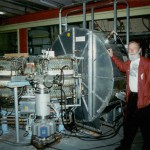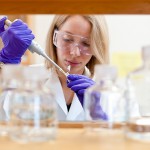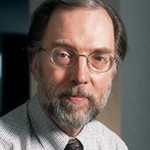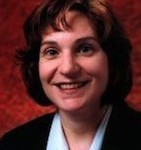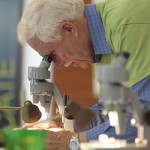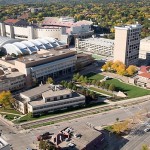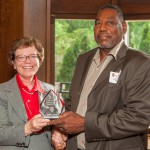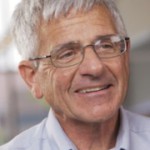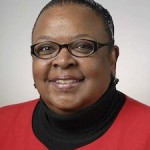Tag Institutional awards
UW–Madison named platinum-level Bicycle Friendly University
The UW is one of eight universities and colleges so honored by the League of American Bicyclists as part of its mission to create a “bicycle friendly America for everyone.”
UW-Madison storage ring designated as historic site
The world's first dedicated source of synchrotron radiation, an electron storage ring named Tantalus, has been designated an historic site by the American Physical Society.
UW-Madison honored for support of employees in the military
When Division of Information Technology (DoIT) Mobile Strategy Manager Dave Schroeder was asked whether the University of Wisconsin–Madison supports the military, he had a lot to say.
Grad program honored for closing science-society gap
The University of Wisconsin–Madison’s Neuroscience and Public Policy Program was honored by the Society for Neuroscience with the Neuroscience Graduate Program Achievement Award.
Largest grant ever awarded to UW School of Medicine and Public Health will continue inner-city asthma research
The National Institute of Allergy and Infectious Diseases (NIAID), part of the National Institutes of Health, has awarded the University of Wisconsin School of Medicine and Public Health (SMPH) a seven-year, $70 million grant for its continuing work on the Inner-City Asthma Consortium (ICAC) - a nationwide clinical research network to evaluate and develop promising new immune-based treatments. The goal of the work is to reduce the severity of asthma in inner-city children, and to lead research efforts into preventing this disease.
UW-Madison awarded $8.3 million for new urological research center
The University of Wisconsin–Madison has been awarded an $8.3 million grant from the National Institutes of Health to create a research center focused on urological health. The George O’Brien Center at UW–Madison is a collaboration with the University of Massachusetts-Boston to enhance the diagnosis and treatment of male urinary symptoms associated with hormones, aging, obesity and benign prostate enlargement.
UW-Madison to launch new transportation workforce center
The University of Wisconsin–Madison is launching a new center aimed at bolstering the Midwest transportation industry by providing training and opportunities for more people to pursue careers in transportation.
Phi Beta Kappa Society recognizes Wisconsin Science Festival
The Phi Beta Kappa Society’s National Arts & Sciences Initiative will recognize the Wisconsin Science Festival with a Key of Excellence Award at a…
University-Community Partnership Awards celebrate successful collaboration
The awards, revived last year after a break of several years, highlight exemplary partnerships that get to the heart of the Wisconsin Idea: community members and UW–Madison personnel working collaboratively to transform the campus and community for the public good.
Law School clinic founders win Best of Madison Business Award
Anne Smith and Eric Englund, co-founders of the Law & Entrepreneurship Clinic at University of Wisconsin Law School, recently received a 2014 Best of Madison Business Award from Madison Magazine.
Physics Nobel awarded for Higgs particle; UW played key role in research
UW–Madison teams led by physicists Sau Lan Wu and Wesley Smith have played crucial roles in the development and operation of the two main experiments at the Large Hadron Collider (LHC) that discovered the Higgs boson in July 2012.
UW wins grant to study menthol cigarettes
The National Heart, Lung, and Blood Institutes (NHLBI), in collaboration with the FDA, has awarded the University of Wisconsin Center for Tobacco Research and Intervention (UW-CTRI) a $368,000 grant to study the use of menthol cigarettes. This project will add to the body of research the FDA is examining to determine whether or how to regulate menthol flavoring in tobacco products.


